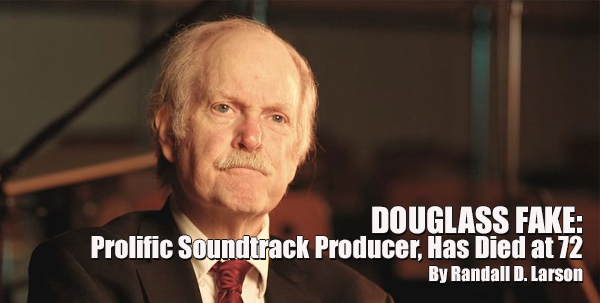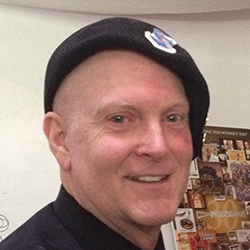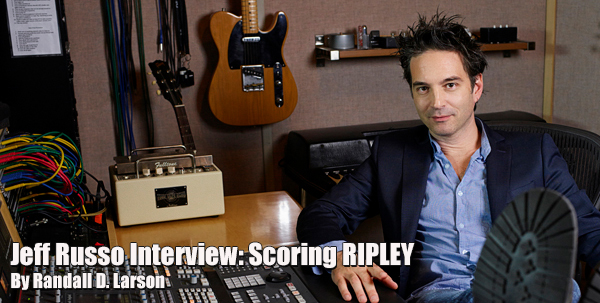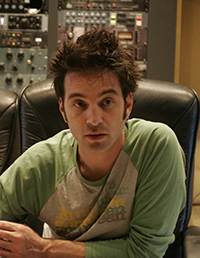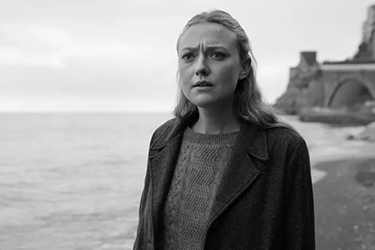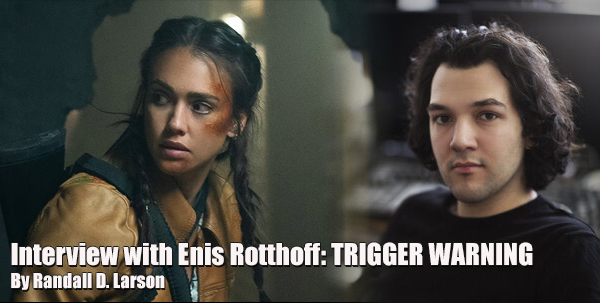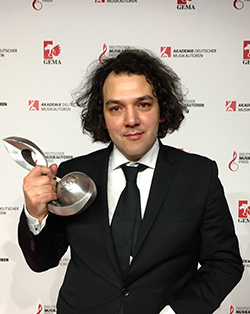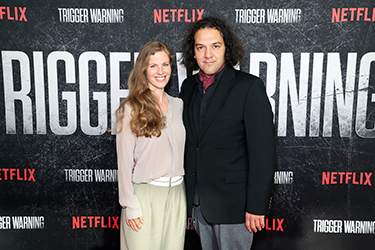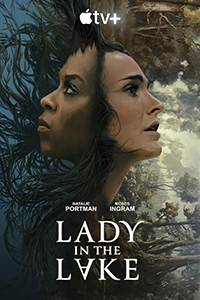
 |
||
|
Soundtrax 2024-7: Special Edition
July 2024 –Interview SpecialDouglass Fake, Prolific Soundtrack Producer, Has Died at 72
Feature Interviews:
• Jeff Russo Interview: Scoring RIPLEY
• Interview with Enis Rotthoff: TRIGGER WARNING
News:
• Film & TV Music News
• New Soundtrack News
I got to know Doug at the early CineMonde days in San Francisco, when I brought my early CinemaScore magazines to the store for him to sell, and I has the opportunity to promote his first soundtrack album, Basil Poledouris’s RED DAWN album. He was one of the first soundtrack promoters in the area, later moving across the bay to Oakland. Doug’s influence in bringing important soundtracks into the area and maintaining that business brought significant opportunities for film music to flourish via the important Intrada soundtrack shop and website.
Douglass Fake, an independent record producer (with over 700 credits) and a champion of classic film music restoration for four decades, died after an extended illness on Saturday morning, July 13, in Richmond California.
“Today, there remains a healthy slate of projects in various stages of completion at Intrada, all bearing Douglass Fake’s influence if not direct participation,” wrote Roger Feigelson, VP of Intrada’s business affairs. “We plan to continue operation of the store and label well into next year, to celebrate Intrada’s 40th anniversary. We’re excited to share some titles that have been in development for a long time. The business is healthy. the market is stable—it just won’t be as much fun without Doug. We miss him already.”
Mr. Fake is survived by his sister Peggy, his wife Mary Ann, daughters Regina and Veronika, and granddaughter Amelia. A celebration of his life and other tributes will be announced shortly.
For more details, see Joe Sikoryak’s memorial to Douglass Fake on the Intrada website.
Sincerest thoughts and condolences to his family, the Intrada team, and all those whose collections of film music were expanded and enjoyed through his efforts and musical treasures.
– Randall D. Larson (photos via Intrada)
RIPLEY is an American neo-noir psychological thriller television limited series created, written, and directed by Steven Zaillian, based on Patricia Highsmith's 1955 crime novel The Talented Mr. Ripley. Starring Andrew Scott as Tom Ripley, with Dakota Fanning as Marge Sherwood and Johnny Flynn as Dickie Greenleaf, the eight-episode limited series is the first adaptation of Highsmith's novel to a series.
In late 1950s New York, Tom Ripley, a down-at-the-heels con-man, is hired by a wealthy man to convince his prodigal son to return home from Italy. But Tom's introduction to Dickie Greenleaf’s comfortable and leisurely life abroad turns out to be “the first step into a complex life of deceit, fraud, and murder.”
The limited series premiered on Netflix April 4, 2024.
Watch the RIPLEY series trailer, via YouTube:
Q: I was quite taken by this series, especially your musical treatment. How did you become involved in the RIPLEY series, and did you work with Steven Zaillian to give it the music it needed?
Jeff Russo: I worked with Steve before; we did a show called THE NIGHT OF eight years ago. We became friendly, and we were out to dinner. He told me about his adaptation of a Patricia Highsmith novel and said he would like you to be involved. I said, “Great, I’d love to.” That’s really how it all started. We had this back-and-forth of me writing music and sending it to him. Then him having opinions about where and how we might use specific thematic material and certain types of music, and when we felt like he didn’t have something, he just called me and said, “We need something a little more like this; we need something like this,” and how we’re going to end up utilizing it is one of the last steps in the process. I created a bunch of themes, and then more themes, and then he had thoughts on what I was making, and then at one point, he said, “We really need some more sort of Sicilian Italian style music to really put us in our place. That’s really how our back-and-forth went, between me and him.
Q: Would you describe the series’ thematic elements and how they were created?
Jeff Russo: At one point, I had this conversation with Steven, and he had said, “Look, we’re not making anything romantic. There’s nothing romantic about this telling of the story. We’re telling a story about a psychopath and the potential for this person to be a serial killer.” That sent me on a different path than I was initially thinking about because, as I was looking at pictures and seeing these stunning images, I was inspired to want to play into that. At some point in the process, as I was writing episodes one and two, Steven called me and said, “Hey, why don’t you go to episode seven. Write episode seven and see how that informs what you do in episodes one and two. When I did that, it changed my point of view on how I approached the music. Knowing where I would end up helped me define the journey’s start.
Q: How have you determined the series’s orchestral or instrumental pallet?
Jeff Russo: I didn’t set out to have a specific pallet. I had a little bit of an idea – I knew there would be strings involved, I knew there would be some woodwinds, but I didn’t yet know precisely what that would be. I didn’t have a pre-determined idea – I looked at it as it developed. I did look at early ’60s film noir movies to get an idea of what those scores sounded like and what those composers did, but I wasn’t trying to do one thing in particular. I didn’t want to make a throwback score or a modern thriller with moments of what it felt like to be in the 1960s. There wasn’t a decision made before I started writing. I don’t like to limit myself when it comes to what I’m deciding to do; I let it be what it will be and then work it out afterward.
Q: How do we get to know Ripley’s character through the various episodes, and how did your music change or begin to describe him?
Jeff Russo: I had this conversation with Steve once I redirected my focus onto Tom being a psycho, and that took me from this one idea and put me onto this other idea, which was a lot more off-kilter and subtly unnerving, and that was a big part of wanted to achieve once I had this new direction – which was this [much more] unsettling feeling. He sort of stumbles as he goes, not really knowing - I mean, he’d never killed anybody before, and he never had to cover it up, so he was figuring it out as he was going, and I wanted to make sure that the score underlined that. I didn’t want to have too much empathy for the psycho, but I did root for him, so it was a push-and-pull.
Q: How has the noirish style of the film affected your musical for the series?
Jeff Russo: What I saw affected me, and it affected what I was going to write. The performances, the cinematography, and everything really had a profound effect on how I wanted to write. But all of it is par for the course – I read a script and have one idea. I see the first cut, and I have another idea, and then I see the third cut, and I have another idea. Then I have a conversation with the director and the filmmaker, and then I have another idea, so it’s like the entire process has a guiding effect on how I go about doing it. I try not to have too much of a box to put myself in.
Q: Your use of music throughout each of the 8 episodes is both thematic and, on occasion, quite different, even if there is almost no music in some episodes. Would you describe your musical treatment for each of the episodes for me?
Jeff Russo: I didn’t work like that… We were looking at it like one big storytelling. I wasn’t trying to do one thing in one episode that I wasn’t trying to do in another, or vice versa. It doesn’t make much sense to pick apart a score from an episodic perspective but to look at it as telling the story between two points in time, and the music did, I want to say, blossom and grow the character of Tom and his descent into the abyss.
Q: I guess what I was trying to say was that there was one or more episodes with almost no music, and I found that to be an intriguing sonic palette…. I was especially interested in your use of silence in Episode 5….
Jeff Russo: There are two episodes like that, episode 3 and episode 5. Episode 3 has a good amount of music before the boat scene, and then the entire boat scene, which was about eighteen minutes long, has no dialogue or no music at all; it’s just the sound of the boat and various other sounds, like the sound of the oar hitting Dickey. And then Episode 5 has very little music. The idea of using music… You can use silence in the same way that you can use music, so you can almost use silence when you’re careful how you use music, sometimes to a more significant effect than music. As a composer, I think that part of my job is figuring out where to use music, putting it where it should not be, and how it scores a scene. We did that very meticulously for all these pieces. I feel like, as the story progresses, we use more and more music as we get farther and farther down the story, as it becomes more important to underline Tom’s descent.
Q: What has been most challenging and rewarding about scoring RIPLEY?
Jeff Russo: There wasn’t a specific thing that was all that challenging – the challenge was that this was a very intricate, subtle, and nuanced telling of this particular story. It was trying not to be on the nose, trying not to hit the nail right on the head. The tropes we use to describe something, like using music to lead the audience, are not something we ever really wanted to do. The music mainly plays the scene, and it plays the feeling. We made a great effort to spend a lot of time figuring out exactly what notes go where. As much time and effort was spent on what shock goes where it does in immersing the viewer in the feeling of the story. That was a complicated task. I worked on the score for about two-and-a-half or three years. Having that back-and-forth discussion with Steve about it is very interesting. Steve is an exceptional filmmaker, so he has this idea of what he wants to see, feel, and hear, so it is a tall task of taking that and transmuting that into music. Or the lack of music. However, the most significant part is that the end result is such a unique and spectacular version of this story, and it’s such a beautiful telling of it: the way it looks, sounds, and feels. It’s such a profound show, such a profound telling of the story, and that, to me, is one of the most rewarding parts of it. To hear it all rolled together and have it all working together, everybody was operating at one hundred and twenty-five percent at all times! That’s always rewarding.
Q: What is coming up next for you that you can talk about?
Jeff Russo: I’m working on several projects; most notably, I’m working on the eight-episode miniseries based on the world of ALIEN. I’ve been working on that for a while. I’m working on some new STAR TREK stuff currently in the hopper, and I’m working on a few topics I can’t talk about yet. I’m just finishing up a movie for a director named John Avnet called THE LAST RODEO. It’s been a lot of fun and different for me. It’s a bit of a Western-ey family drama for which I have greatly enjoyed writing the score.
Thanks to Alix Becq-Weinstein and Jana Davidoff of Rhapsody PR in facilitating this interview, and to Jeff Russo for taking time out to answer my questions about scoring RIPLEY.
The soundtrack album to RIPLEY is available from Amazon, Spotify, Apple Music and other digital music sources.
A vinyl soundtrack will be available as a pre-order from Waxwork Records.__________________________________________________________________________________________
Enis Rotthoff is a German composer who splits time between Los Angeles and Berlin. His passion for scoring films combined with his orchestral mastery and cutting edge electronic sounds, has made him a leading voice for cinematic music in Germany and has contributed to his growing international reputation. Through his focus on close collaborations with filmmakers, he is able to build true cinematic concepts providing a unique musical language for each film he scores. His range of music includes works for small ensembles, electronic works and big orchestral pieces that include both rare and electronic instruments. He has collaborated and recorded with some of the finest European Orchestras and Soloists such as trumpet player Till Brönner, cello-virtuoso Johannes Moser or violinist Kolja Blacher. He loves to work in a wide range of genres from orchestral scores for children’s movies like FREE WILLY: ESCAPE FROM PIRATE´S COVE and LASSIE - A NEW ADVENTURE to an electronic score for the Wall Street drama THE PRICE, a small string ensemble for the British drama LOVE SARAH or the hybrid orchestral and electronic score for the psychological thriller THE GOOD NEIGHBOR, the dramatic mystery THE RECKONING, the Austrian bio-comedy MEIN KAMPF, and the German comedy WOMAN IN LOVE, and the highly acclaimed film MEASURING THE WORLD, which he recorded with the Radio Symphony Orchestra Vienna and garnered him a Jerry Goldsmith Award nomination.
TRIGGER WARNING is a 2024 American action thriller film starring Jessica Alba as Parker, a highly skilled Special Forces officer who takes ownership of her father’s bar shortly after he dies, and soon finds herself at odds with the violent gang running rampant in her hometown.Watch the trailer for TRIGGER WARNING, view youtube:
Q: What, briefly, initially brought you into scoring films?
Enis Rotthoff: I was fascinating my film music as a kid, really when I was 7 or 8, I loved the music in films. I was playing piano, already, at that time, I was taking piano classes, whenever I listened to a score I would try to memorize it while watching the movie, and tried to play the melodies on the piano, afterwards. For me, it was something I enjoyed a lot. Over the years I was more and more fascinated by film music, and started improvising on the piano. From that it was very natural to explore film music as much as I could, and in my teenage years I became more serious about it and wanted to explore how to become a film composer. I had a scholarship for young composers in Berlin during my teenage years, and then I looked into studying film music but I also wanted to learn as much as I could about film so I studied audiovisual communication and I also studied film music in the Babelsberg University in Germany, and that’s how I started. I think the biggest impact from all these was probably being an assistant to film composer Jan A. P. Kaczmarek, for whom I’ve worked seven years. Working for projects with him really opened up the world for me to understand how to actually score movies.
Q: You’ve scored a number of action films in the past – what was most unusual or distinct about scoring TRIGGER WARNING?
Enis Rotthoff: For me, it was interesting that it was a female-led action movie, and we explored. Together with director Mouly Surya how we could make a statement that is equally a bold action movie, but also support her mode emotional side. Having said that, what I like in some action movies is we give the hero or the warrior some emotional depth. That is usually done by a backstory, but the music can equally support the depth of the character, and that’s what I found very appealing. I love film music and I working with the power of film music, making the film as cinematic as possible.
Q: How did you work with director Surya in discovering the kind of layered musical palettes that this score would need?
Enis Rotthoff: Our approach in the beginning was to have a kind of laboratory approach, where I would show her what just one instrument would do to a scene, and we explored different sound worlds, electronic sounds as well as very unique, let’s call it experimental sounds, what a Western guitar does to a scene, that would evoke a western feeling and what we discovered was that more is more on this film! So a multi-layered approach gives the film more complexity and serve the different layers of the story and the emotional connection with Parker, our main hero, has. But this lab approach also infused all the different elements of the score.
Listen to the track “Welcome Back to Creation” from TRIGGER WARNING, via YouTube:
Q: The score of TRIGGER WARNING seems to mix a number of pensive or tender motifs (such as “Memories of the Past”) against a recutting number of driving pulses (“On Fire,” “Macheta” and the like), which powerfully ratchets up the energy and danger of Parker’s situations. How did you derive these treatments into the score?
Enis Rotthoff: First I created the theme for Parker, that we hear in the opening titles. The cue is called “Welcome Back to Creation” and “Creation” is the town where she is from. There are thematic elements – I saw thematic elements because sometimes it’s not possible in an action film to bring in the whole melody, so it’s thematic elements that reoccur over the course of her journey. The pain of losing her father, with her suffering, fuels her revenge. So the main theme consists of her connection with her father and her past, and the hero’s journey, basically. These elements reoccur even in action sequences. So, “Memories of the Past” is looking back into her past in a positive way, and the warmth and the things that she feels with her father. That piece actually comes at the moment where she drives home to Maria’s bar, the bar where her father used to own. So, everything seems connected, and therefore I tried to not only bring in thematic material that I use over the course of her journey as well as soundscapes or certain instrumentation that I use both in emotional moments as well as in action moments. “Machete” is a great example, because it includes the Western sliding guitars that we hear during “Memories of the Past,” when she finds her machete that she will use in her journey. It’s almost like a transcendental moment, and it all makes sense for her as a warrior. I think we’re also giving homage to Asian action cinema, where you have the connection of the warrior together with his weapon – so we were a little romantic with it and played with it!
Q: How did the film’s title, TRIGGER WARNING, suggest a musical treatment that drove the sonic elements of the story from start to finish?
Enis Rotthoff: That’s a great question. I’m not sure if the title infused that, but knowing the title, because the title was already set when I started working on the movie, it did evoke that we wanted the audience to immerse into something. I think emergence was the number one goal of the score for this film.
Q: What was your instrumental palette for the film’s score? I know it’s a little bit different, combined, but how would you describe what you have to begin with?
Enis Rotthoff: Yes. We started with Western infused guitars – slide guitars, I bought myself a resonator guitar, as it evokes that Western feeling. I learned to play it for this project, as I felt it would be more appropriate to improvise on it than have someone else try out things, because I didn’t know how to write for resonator guitar, so the recordings with the resonator guitar were played by me. I wanted to infuse the Western feeling with something fresh, so we brought in synthesizers that were more retro-synthesizers, like from the ‘80s and the ‘90s, and that was based on Parker’s childhood in Creation. So, infusing the Western feeling with retro synths gave me the original idea of what we’re hearing now. And, from the concept of having several layers, we added strings, brass, old percussion, and one instrument that is very dear to me, that is the GuitarViol – it’s a half cello/half electric guitar. We amplified and distorted it, and it became that gritty sound that is omnipresent, but the audience might not hear it, but should feel it. It’s there in her emotional moments as well as in her action moments.
Listen to the track “Catch Ya Later” from TRIGGER WARNING, via YouTube:
Q: Would you describe in a little more details the instruments and/or electronic elements that you’ve mixed into the TRIGGER WARNING score, and how you’ve used them?
Enis Rotthoff: I think one thought was, how can I have something present but not too obvious, and how can I have something driving but not too aggressive. With these questions, we aways ask ourself when does a synth sound become tiring, when is it driving the action, when is it appropriate for the picture, actually, and how can we make variations. So, I found that very minimal sounds that don’t have too much flavor, I might even say, that we’re more efficient in blending with the orchestra than having sounds that are very easily recognizable. One thing that was striking and inspiring was, I used synth sounds that were playing as an arpeggio, for example, together with strings, and it was almost like my string arrangements were inspiring the synth sounds to be different, and the synth sounds were inspiring the orchestra to be different. Sometimes I was playing with the perception of “if this a real orchestra or is this a synthesizer?” It's based on distorting the orchestra, actually, or using synth sound in a way not to imitate the orchestra – especially brass – but have an equal impact. So, for me it was all about variation and playing with perception to make it as immersive as possible.
Q: How would you musically treat Parker as she journeys across the film’s storyline, learning to trust or not to trust a variety of locals, some of whom will pose a real danger?
Enis Rotthoff: There are two things that happen over the journey. The one thing is that her investigative approach helps her to solve riddles, over the course of the film, and I took this more like an investigative story, very straight forward. And, at the same time, you have her drive, fueled by her revenge. We tried to make this the least dark as possible, and more enjoyable.
And there’s another journey I want to mention here, which is very dear to me, which is how she handles the pain of losing her father. In the beginning, she has either warm or cold memories of him. There are flashbacks in the film that I consciously scored in a cold way, as she cannot really connect to that memory any more, and then there are moments where she, for example, comes to Maria’s, where the music is very warm, and it represents her good memories of him. Over the course of the film, her acceptance of the pain turns into something beautiful – so there is a theme for her suffering, or her loss, that culminates towards the end of the film when she goes to Maria’s and finds it has been burned down, and here you feel she had embraced her pain, and it turns into something beautiful that fuels her balance. I consciously created string arrangements which became more sophisticated over the course of the film for her emotional moments. I enjoyed that a lot.Q: What can you tell me about the film’s subordinate characters – were there any other motifs, themes, or elements that you’ve used, especially for friendly characters or those who Parker realizes are villains?
Enis Rotthoff: On the investigative story line we have Spider, her friend who helps her solve these situations. We have an investigative theme that is more to him, so that is, maybe, his theme. But everything is centered toward Parker. I tried to stay away from creating a “real theme” for the bad guys, because it’s all through her perception. There is a musical choice I made for Senator Swann to have a tuba that is very subconsciously underneath his character, but I didn’t want to create a theme. It was more like giving him a different sound palette.
Listen to the track “Bike Ride” from TRIGGER WARNING:
Q: I’m especially fond of the track “Bike Ride,” which has a cool mix of electronics and orchestra, almost a marcado in it’s string treatment which is enhanced by a variety of percussive sounds and electronic wails. What can you tell me about creating and utilizing this track in the score? [Marcato is a musical instruction indicating a note, chord, or passage is to be played louder or more forcefully than the surrounding music.]
Enis Rotthoff: This is actually one of the moments in the film where we felt, early on, that we nailed it, emotionally. It was actually a scene that helped us work in another scene. It represents the character introduction of Parker that we had not experienced before. I can say that the synth sound had a ‘90s retro feeling, and you see her on the stunt bike, it’s almost like you don’t know in the first second if it’s a flashback to her childhood where she’s a teenager on a bicycle, or if she’s riding the stunt bike. And I wanted to play with that. And then, anything that comes afterwards, I would say it’s almost the moment of the character introduction of Parker. So the strings and the synth play the same phrase, and sometimes the synth shins through and sometimes it’s the strings, and I found that very beautiful. It’s basically telling the audience, “This is Parker,” but not telling everything – just as an introduction. I consciously took out the melody that we hear later or when she has her moment with the machete. It’s also a memory of the bike ride moment.
Q: How did the opening scene, the battlefield, what was your music for that and how did that bring into what we see after?
Enis Rotthoff: What’s interesting is, I worked on the battle scene much later, and so many moments were already scored in the movie, and even though I had everything, I tried to stay away from including too much in the opening, as it is like a prologue. Some character elements are in that scene, so for her fighting style, and moments we see later in the film, are scored in a similar way when Parker, the fighter, is there, but I tried to, almost, score it in a way that when the movie really starts it feels refreshing.
Q: Finally, what can you tell me about music for the film’s end titles, which calls back to the film’s compelling opening music in a pleasing resolution?
Enis Rotthoff: The ending of the movie has the same music as during the opening titles, but it changes toward the end – which means the opening titles end with an electronic guitar and it’s almost like Parker’s coming home to her home town, and the story is starting. Whereas, in the end of the movie I used the sliding guitar that was connected to her past, and it’s a very minimal element but it does make a huge difference, emotionally, so the idea was that as the end, she has embraced her past self and her new self.
Q: What’s next for you that you’re able to talk about?
Enis Rotthoff: I just recorded an orchestra in Budapest for a film about former tennis players Andre Agassi and Steffi Graf. It’s a tennis movie but it’s also a love story. I grew up watching Andre Agassi and Steffi Graf on TV and so this is a dear project to me. I recorded a string ensemble with two harps, and the two harps represent Andre Agassi and Steffi Graf. So it was a fun project to work on and also very refreshing after an action movie.
Special thanks to Christian Endicio of WhiteBear PR for facilitating this interview.
For more information on Enis Rottoff, see his website here.
Rotthoff’s soundtrack album for TRIGGER WARNING is available to stream or download on all major digital music services.
________________________________________________________________________________________________________________
Film & TV Music News
Paramount Pictures Presents Ridley Scott’s GLADIATOR II, which premieres on Nov 22, 2024 in the USA. The music is by Harry Gregson-Williams. OFFICIAL SYNOPSIS: From legendary director Ridley Scott, Gladiator II continues the epic saga of power, intrigue, and vengeance set in Ancient Rome. Years after witnessing the death of revered hero Maximus at the hands of his uncle, Lucius (Paul Mescal) is forced to enter the Colosseum after his home is conquered by the tyrannical Emperors who now lead Rome with an iron fist. With rage in his heart and the future of the Empire at stake, Lucius must look to his past to find strength and honor to return the glory of Rome to its people.
Antonio Manca has scored the film RADICI DI BRONZO (Bronze Roots) by Andrea Loddo. The documentary film is a historical reconstruction of the ancient Nuragic civilization, which lived in Sardinia Island approximately 1277 BC. The film’s story follows Dan, a young warrior who returns home to find his father. Dan's father is the tribal chief and he will give his son the task of taking care of the village, the lands, the army. It is a moving story through which life in the Nuraghi is told, the rituals that were performed, the ancient traditions that we have reconstructed with the artifacts and historical and archaeological studies. Manca has created a score rich in ancient sounds and archaic moods. “In addition to percussions, the other musical instruments present in the artefacts of the Nuragic civilization are wind instruments, 3 pipe flutes called “launeddas,” with a sound similar to bagpipes, still in use today in Sardinian folk music,” the composer told Soundtrax. “In my original score for this movie I used this amazing sound of launeddas played by Michele Deiana and Luca Schirru, the female voice of Sofia Dedola and the concert flute played by Mattia Impagliazzo. The percussion instruments were built and played by Fabrizio Fazio, a Sicilian percussionist. The vocal theme is inspired by ancient melodies, Greogorian chants and Ancient Greek music. Very modal music. The Sofia's voice is very natural, without vibrato. My goal was to recreate the suggestions of an archaic, ancient and distant world with the modernity of electronics, synthesizers and sound design.”
__________________________________________________________________________________________
New Soundtrack News
Intrada has announced the CD release of Jerry Goldsmith’s music composed for THE GENERAL ELECTRIC THEATER, previously recorded with the City of Prague Philharmonic Orchestra and reconstructed and conducted by Leigh Phillips. Phillips spearheaded several Kickstarter campaigns to fund the recording of these scores for digital release. Now Intrada presents these recordings on compact disc. THE GENERAL ELECTRIC THEATER was the longest running anthology TV series at ten seasons, largely featuring scores by Elmer Bernstein (featured on a previous Intrada release). Until Phillips had recorded the Goldsmith scores, they had never been available. While it is difficult to confirm how many scores Goldsmith composed for the series, his earliest is Hitler’s Secret dating back to 1959, with the latest being The Bar Mitzvah of Major Orlovsky from 1962. This new album consists of some scores that survived in written form and others that Leigh Phillips was able to reconstruct by ear using the episode audio. See Intrada.
Madison Gate Records has released a new soundtrack album for the Prime Video original series THE BOYS. The album features selections of the original score from the show’s fourth season composed by Christopher Lennertz (LOST IN SPACE, AGENT CARTER, HORRIBLE BOSSES, RIDE ALONG) & Matt Bowen (GEN V, THE BINGE, BEST.WORST.WEEKEND.EVER.). Also included are the new season’s original songs. The soundtrack is now available to stream/download on Amazon and any other major digital music services. The label has previously released three albums featuring Lennertz’s music from Season 1, Season 2 & Season 3. - via filmmusic reporter
LADY IN THE LAKE, the eagerly awaited Apple TV+ series, immerses viewers in a gripping tale set amidst 1960s Baltimore, where the lives of two women collide on a fatal trajectory. Starring Natalie Portman as Maddie Schwartz, an investigative journalist, and Moses Ingram as Cleo Johnson, a mother navigating Black Baltimore's political landscape, this feverish noir thriller directed by Alma Har’el explores the profound sacrifices women make for their dreams. Dr. Marcus Norris’ evocative score for the series transcends traditional television music boundaries, avoiding clichés while creating a distinctive, iconic sound. Integral to this musical achievement is the South Side Symphony, founded by Dr. Norris, which reimagines orchestral music with influences from Quincy Jones and 90s R&B and rap. Their predominantly Black ensemble brings a dynamic freshness to Marcus's score, enriching the show’s identity with their motto, "Our Music in Our Time," reflecting their mission in contemporary music storytelling. LADY IN THE LAKE premiered on July 19 alongside its original soundtrack album.
Apple Original Films, in partnership with Sony Pictures Entertainment, recently hosted the red carpet premiere for its highly anticipated feature FLY ME TO THE MOON, starring Scarlett Johansson, who also serves as producer, Channing Tatum, Ray Romano, Jim Rash, Woody Harrelson and Anna Garcia. “Fly Me to the Moon” premiered globally in theaters on July 12, 2024. The film is a sharp, stylish comedy-drama set against the high-stakes backdrop of NASA’s historic Apollo 11 moon landing. Brought in to fix NASA’s public image, sparks fly in all directions as marketing maven Kelly Jones (Johansson) wreaks havoc on launch director Cole Davis’s (Tatum) already difficult task. When the White House deems the mission too important to fail, Jones is directed to stage a fake moon landing as back-up and the countdown truly begins. The music by Daniel Pemberton, the soundtrack album is available from Spotify, Amazon, and elsewhere. Read Jon Burlingame’s interview with Daniel Pemberton on scoring FLY ME TO THE MOON.
The Netflix original series DEAD BOY DETECTIVES has presented a soundtrack album through WaterTower Music, offering music by Blake Neely (THE FLIGHT ATTENDANT, CW’s ARROWVERSE series, MASTERS OF THE AIR) and Murat Selçuk from the original score from the show’s first season.
__________________________________________________________________________________________
Randall D. Larson was for many years publisher of CinemaScore: The Film Music Journal, senior editor for Soundtrack Magazine, and a film music columnist for Cinefantastique magazine. A specialist on horror film music, he is the author of Musique Fantastique: 100+ Years of Fantasy, Science Fiction & Horror Film Music, and Music from the House of Hammer. He currently writes articles on film music and sf/horror cinema, and has written liner notes on more than 300 soundtrack CDs. He can be contacted via https://musiquefantastique.com/ or follow Musique Fantastique on Facebook. Follow Randall on Twitter at https://twitter.com/randalldlarson and https://twitter.com/MusiqueFantast1
Originally posted at https://musiquefantastique.com/
